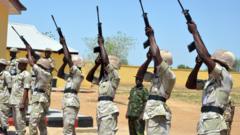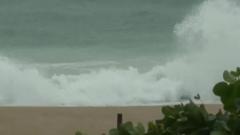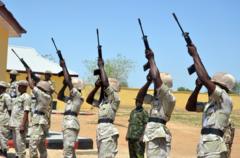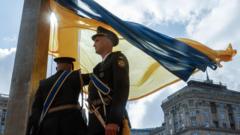With Russia controlling a significant portion of Donetsk, humanitarian efforts intensify as people evacuate from towns like Dobropillya. Residents and aid workers narrate harrowing experiences amid drone attacks and deteriorating living conditions. The fate of the Donbas region remains uncertain as both military strategies and civilian hopes intertwine in this ongoing conflict.
Donetsk on the Brink: Civilians Evacuate Amidst Intensifying Russian Assaults

Donetsk on the Brink: Civilians Evacuate Amidst Intensifying Russian Assaults
As Russian forces push into the Donetsk region, residents of the embattled town of Dobropillya flee in search of safety, highlighting the humanitarian crisis sparked by ongoing conflict.
Inside the conflict-ridden town of Dobropillya in Ukraine’s Donetsk region, the situation continues to deteriorate as residents flee daily due to relentless Russian attacks. The area, long targeted by Moscow, is crucial to both military strategy and local sentiments, with many civilians now forced to leave their homes behind.
Donetsk has been under Russian control for some time, with reports indicating that approximately 70% of the region is now in Moscow's hands. Amidst advancing troops, humanitarian efforts are active, aiming to rescue the most vulnerable inhabitants. A BBC news team, accompanied by volunteers from Universal Aid Ukraine, recently reported on the evacuation process as they made their way to Dobropillya, just a short distance from the frontline.
Upon arrival, it became apparent that the town was largely deserted, bearing the scars of ongoing conflict. Many buildings stood in disrepair, and vital supplies like water had been unavailable for over a week. Volunteers have worked tirelessly to assist in evacuations, with particular concern for the elderly, sick, and children, who are particularly at risk.
During one of their recent missions, a 56-year-old resident, Vitalii Kalinichenko, shared his experience of living through the assaults, expressing a blend of anguish and resignation. The emotional toll is evident as families grapple with separation; Anton, a local resident, struggled to leave his mother behind, indicating the deep personal impacts of the war.
While some evacuees advocate for a peaceful resolution through negotiations, distrust toward Russian intentions persists. Varia, a 19-year-old volunteer, articulates the sentiments of many locals who fear that yielding territory would only embolden further aggression from Moscow.
Military and civilian perspectives intertwine in discussions about the future of the region. Despite President Volodymyr Zelensky’s assertions that full occupation by Russian forces is a distant concern, many believe that without strengthened support from the West, the outlook remains grim. The defense of Donetsk is seen as crucial, with potential implications for the security of nearby regions.
As medical teams brace for the continuous influx of wounded from the ongoing violence, the outcome remains precarious. Surgeons at local field hospitals emphasize the gravity of injuries, particularly from drone strikes, with pleas for a solution that does not involve surrendering territory to Russia echoing throughout the medical community.
Meanwhile, encroaching Russian ranks, estimated at over 100,000 troops, present increasing threats. Barbed wire, trenches, and fortified positions dot the landscape, revealing a preparation for prolonged conflict.
Until a diplomatic resolution emerges, a battered Ukraine continues to contest every inch of the Donbas, with both humanitarian efforts and military strategies reflecting the urgent need for stability amidst chaos.




















